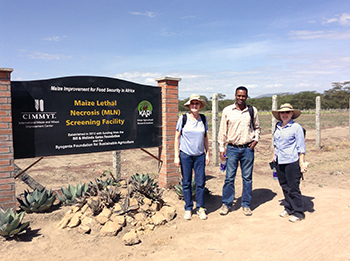Latest News Archive
Please select Category, Year, and then Month to display items
02 January 2020
|
Story Valentino Ndaba
|
Photo Anja Aucamp
 Refilwe Xaba, the founder and CEO of Glolooks.
Refilwe Xaba, the founder and CEO of Glolooks.
Refilwe Xaba, Senior Assistant Officer in Entrepreneurship Development at the UFS Centre for Development Support, is the founder and CEO of Glolooks. This Bloemfontein-based company manufactures and supplies an organic, natural hair product range.
When she first developed the products, they were for personal use. Xaba evolved from an intrapreneur to an entrepreneur. She innovated a personal solution into a booming business idea. It was only in May 2016 that she decided to go into business, following growing interest in the way she maintained her hair. “I officially started in-depth research in October 2015, after years of making concoctions for myself.”
Business and books
Xaba reckons that a research background is beneficial for growing a business such as Glolooks that has a huge technical aspect. She is currently pursuing her PhD in Entrepreneurship with a focus on marketing and is planning to use her business as a case study.
Her undergraduate, honours, and master’s studies, which she completed at Kovsies, contributed to equipping Xaba with skills to grow her business. She believes in balancing education and business. “I have always been commerce-orientated. If there is a problem to be fixed, I fix it. However, people are at the centre of my heart.”
Growing Glolooks
In 2019, Glolooks opened a salon in Westdene, where customers can receive a holistic experience above and beyond merely purchasing the product. Xaba says this is one of the ways her business is being innovative when it comes to creating relationships with customers.
Maize breeder rewarded for his research to enhance food security in Africa
2016-08-26

Prof Maryke Labuschagne from the UFS Department
of Plant Sciences, Berhanu Tadesse Ertiro, a
postgraduate student in Plant breeding at the UFS,
and Dr Peg Redinbaugh of the US Department of
Agriculture in Wooster, Ohio.
Photo: Supplied
Ethiopia is one of the African countries, deeply affected by food insecurity. Berhanu Tadesse Ertiro, a citizen from Ethiopia started his career - after graduating with his undergraduate degree in 2003 - as a junior maize breeder. Today he is pursuing his doctorate degree in Plant Breeding at the University of the Free State (UFS).
His research had made some great strides in contributing to food security in Africa. He recently received a fellowship from the prestigious Norman E. Borlaug Leadership Enhancement in Agriculture Program (Borlaug LEAP).
This fellowship is only awarded to students whose research has relevance to the national development of the student’s home country or region. The aim of these fellowships are to enhance the quality of thesis research of graduate students from developing countries who show strong promise as leaders in the field of agriculture and related disciplines.
Low soil fertility a major maize production constraint
Berhanu is also a visiting student at the International Maize and Wheat Improvement Center (CIMMYT) in Kenya, where he is running field experiments for his PhD thesis dissertation. His research focuses on Nitrogen Use Efficiency (NUE) and Maize Lethal Necrosis (MLN) disease tolerance. Low soil fertility and MLN are among the major maize production constraints in eastern and southern Africa, where maize is staple food.
Such hybrids have the potential to contribute greatly
towards food security among farmers and their
families through increased productivity.
The use of new tools could increase breeding efficiency and reduce the time needed for the release of new stress tolerant hybrids. Such hybrids have the potential to contribute greatly towards food security among farmers and their families through increased productivity. Berhanu is looking at the feasibility of genome wide selection for improvement of NUE in tropical maize.
Fellowship includes mentorship and supervision across borders
The programme supports engaging a mentor at a United States university and Consortium of International Agricultural Research Centers (CGIAR). During his fellowship, he will be supervised and mentored by Prof Maryke Labuschagne of the UFS, Prof Rex Bernando, a professor of Corn Breeding and Genetics at the University of Minnesota and Dr Biswanath Das of CIMMYT, Kenya.
As a LEAP fellow, Berhanu was invited to attend the 30th Annual World Food Prize events to take place in October 2016, in Des Moines, Iowa. The week will include his attendance at the Board for International Food and Agricultural Development meeting, participation at side-events at the Borlaug Dialogue International Symposium and the World Food Prize.